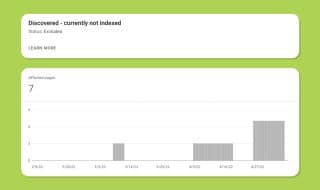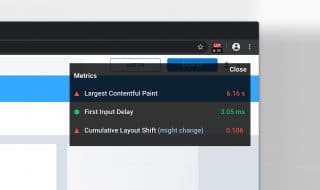Why Are My Pages "Trending Down" in GSC Insights?

Google's various analytics tools are constantly changing and usually improving when they do so. One of the more recent additions, as of June 2025, is the full release of the Search Console Insights Report.
The data in this report is nothing new. You've always been able to see it if you dig around in the performance reports in the Google Search Console. Moreover, the Insights report has existed for years. It was originally launched back in 2020 as a small, closed beta, and then launched openly in 2021 as a stand-alone report. This new change is the integration of this report directly in your Google Search Console instead of as an external resource.
The Insights report is now one of the main headings in the left sidebar, and it takes you to a report on the last 7, 28, or 90 days of performance for your website.
This report gives you a lot of relatively simple but handy information.
- Your current clicks and their trend.
- Your current impressions and their trend.
- Your top content.
- Your trending up content.
- Your trending down content.
- The top, trending up, and trending down queries leading to your site.
- Your top countries for traffic sources.
- Your top alternative traffic sources (like image search results).
In the main pane, this only gives you the top five winners (or losers) for the trending content list. When exploring your content in the Insights window, though, you get more, up to 20, before the search console recommends you look in the performance report.
The question is, if you have posts that are trending down, what's happening? Is it bad, and is it something you need to fix?
What Does Trending Down Mean for Content in GSC Insights?
Just getting the definition alone will probably answer a lot of your questions, so let's get right to it.
The trending content list shows the top five, or top twenty, winners (for trending up) and losers (for trending down) pages on your site.
The list will change depending on whether you have it set to seven days, 28 days, or 3 months, because it's a comparative measurement.

Specifically, trending up means your content has more clicks in the current period than in the previous similar period. Trending down is the opposite; the content has fewer clicks in this period than in the previous period.
If you publish a blog post and it gets 100 clicks in the first week, but only 75 in the second week, it will show up on your trending down list for having decreased 25%, if you have your report set to seven days. If you have it set to four weeks, though, it won't show up in trending down at all, because it hasn't trended downward since its previous month. In those cases, it will be listed as "previously 0" and will only be on the list if it has gained enough to be a top performer on your top content list.
So, why are your posts trending down? All it means is they have fewer clicks this period than they did in the previous period.
That does mean they're getting less traffic from search, but there can be a ton of reasons why that's happening.
Why Posts Might Trend Down in Google Search Insights
If you have posts that are trending downwards in Insights, there are a ton of possible reasons why. Some of them are fine, some of them are rough, and a few are potentially dangerous.

The good news is, a post can't be trending downwards if it never got any traffic in the first place. A downward trend isn't usually a sign of any kind of indexing issue or sandboxing, unless you made a change that would have caused such an issue, which you'll probably know about.
Here are some of the most common reasons, and what you might need to do about them.
There was a Google algorithm update.
One common cause of traffic drops and downward trends is Google algorithm updates. These tend to be fairly steep drop-offs that happen suddenly, and you might not actually catch them in the shorter-period Insights reports. If an algorithm update happens and you don't check for two weeks, but you have your report set to one week, the update may have passed, and your content may all be trending upward, despite your whole site faring worse than it did 2+ weeks prior.
If you see a lot of content trending downward, and not a lot trending upward, it can be an indication that you have a site-wide issue or were hit by a Google algorithmic adjustment. Usually, one of the first things I check to diagnose a traffic drop is the history of Google algorithm updates for this reason.

Look for large negative trends, rather than small percentage changes. Smaller changes or more variability between posts means it's less likely to be a site-wide adjustment.
A new competitor has appeared.
A very common reason why a few posts, especially popular posts, can start to trend downwards is if someone else decides to try to eat some of your lunch.
Nothing on the internet is truly sacred or unique to you. While the exact match wording can be copyrighted, and there are trademarks to consider, the general topics, conclusions, cited information, and other details can all be replicated by someone else, and there's nothing you can really do about it.
It's also a common marketing strategy, and one I employ extensively myself. Look for content that is performing well, and do the same thing but better. Marketing isn't really a team sport, after all.

If you had formerly well-performing posts that are suddenly on a steep downward trend, take a look at the search results for those primary keywords and see if competitors are now out-ranking you.
If they are, how do you address the issue?
- Improve your content, somehow. Maybe make it longer, add new keywords, and discuss new side topics.
- Build more links to the content to help boost its visibility in the SERPs.
- Run ads or a push on social media to get more traffic to the page.
Alternatively, if you're still ranking well and getting a good amount of traffic (just less than you used to), it might not be a problem you need to solve. Minor drops don't necessarily need rapid action, and the content could rally back upwards later, or stabilize.
You're coming down off a previous high.
Because the trending box is a comparison of the current and previous periods, it's a snapshot of a very short-term level of performance. Even the longest possible view is still just six months, and that's not very long when it comes to content marketing.
A lot of content is going to have an initial spike when it's first indexed, before settling down to a more stable "final" place. This can be partially because of Google shuffling you around to find where you get the best response in the SERPS. It can also be from exposure in news feeds, on social media, and through other channels.

I put "final" in quotes, of course, because content ranking well in Google is often multiple years old. The initial surge can be nice, and then you drop down before starting the long, slow climb into an evergreen powerhouse. Content marketing snowballs, which is one of its biggest strengths.
So, if you see a stark drop in traffic for some posts, remember that it's a short-term evaluation of that traffic, and it might not actually mean you're lower than you were. You might have had a big surge, and you've dropped down to a place that is still higher than your previous baseline.
Seasonality is shifting away from the topic.
Short-term trends can be reflective of long-term trends, but they can also be isolated visions that tell the wrong story.
Some of my clients are very seasonal businesses. They have a few prime months each year, and during those months, interest in their topics skyrockets. Looking at short-term insights during those periods will show immense upward trends.
Conversely, after those peak months, their content fades back into irrelevance for the off-season. No one is renting a kayak in Canada in the middle of December, no one is shopping for Christmas trees in April, and so on.

Dedicated content marketing means that the lowest points of the off-season are still higher each year than they were the previous year. But, if you're looking at short-term trends of even three-month comparisons, it can look like a huge drop.
Seasonality isn't something you're likely to fix on a per-content basis. You can balance it out across a business by coming up with more evergreen topics, and that helps site-wide, but there will always be some content that trends downwards, often steeply, in the off-season.
The content needs an update to follow modern trends.
Sometimes content drops off because it falls out of relevance.
Google tries to be fairly smart about what it provides as answers to questions. It has a certain amount of bias towards recently published and recently updated content, because that content is more likely to be useful.
While the top-ranking content tends to be several years old, the actual substance of the content is often kept updated. You get the best of both worlds that way.

A lot of content won't get these kinds of updates, though. Maybe it's content that was following trends that are no longer relevant. Maybe it's talking about an event that has passed and people don't talk about anymore. Maybe it's just Good Enough that you have better ways to spend your energy.
Content that trends downward might need updates to start to push back upward. Often, the downward trend is combined with one of the other causes on this list, though, like seasonality or competition. Either way, updating the content usually doesn't hurt.
You've lost some important backlinks.
Another significant cause of a decrease in traffic is a loss of backlinks.
Whether you performed a backlink audit and disavowed a bunch of low-quality links, or someone else performed their own link or content audit and decided to remove links to you, or even just a good site going offline, links disappear all the time.

Links are also a key part of how Google evaluates the relative trust and value of a page. Losing links is a loss of that trust and value, even if your site has otherwise proven itself.
It can be tricky to notice that backlinks have disappeared unless you're actively watching for them. I've talked about ways to monitor backlinks before, though it's not usually one of the main metrics I'm watching on the daily.
You changed the content in some way for the worse.
A big potential cause of a piece of content trending downwards, especially when it's relatively isolated, is that you changed it in a way that didn't work.
The most common cause of this that I see is editing content in a way that accidentally removes a passage or keyword that was responsible for a significant part of the traffic the post was bringing in. It's easy to get overly focused on a set of target keywords and not realize that the other organic keywords you mention can be impactful as well, and in ways you might not have predicted.

If you made recent revisions to content and now it's trending down, consider figuring out what you cut or changed and restoring some of it.
Is Trending Down Necessarily a Bad Thing?
It's not really possible to keep from having posts that trend downwards. Short-term variability just means that, sometimes, some content will do worse than it did the previous week/month/quarter. That's not a problem, that's just a fact of life.

To me, the value of the trending down insights report is to look for outliers. If something is trending down by a significant margin, that might be something to look into. If a lot of your site is trending down by a lot, do some digging. Otherwise? I wouldn't sweat it too much.










Comments